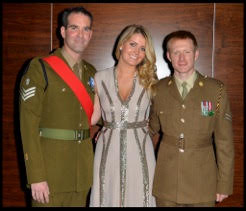Evening All – Taking Classes Out Of Hours
If you’re looking for a career in an area that’s completely unrelated to your Military skills and experience you may find yourself needing to spruce up your qualifications a little. Evening classes are a good first step.
On leaving the Services it’s a smart move to take stock of what you want to do and what you have to offer by way of experience and qualifications, to whichever field you’re going to attempt to find work in post Forces. As we’ve stated many times, Service-leavers are in an enviable position, in that they can make real choices about what they want to do given that their lump sum (on exit) will likely tide them over for a while and give them some space to think about their future.
Formulating a plan is the sensible thing to do and should start from the end point or outcome that you want to get to. It might be that you want to work in a specific organisation or sector that demands certain higher qualifications and so your plan should be to eventually take a degree or whatever the industry standard is. Although it’s altogether possible to study for a degree with a university (through evening classes or otherwise), working backwards could take you as far back as foundation courses, vocational courses or any missing GCSE’s that you might need.
Back into education
The process then might start with small decisions regarding subject areas and the like and gently breaking back into education. Evening classes can be just that – and then scaled up. From basic maths or English through to specialised courses in relatively obscure skills or subjects such as sign language etc.
As with any evening classes, you might have to wait for the start of a new term. Autumn term will have already started and so January is your next target, when Spring term commences. Whilst you’re probably keen to get stuck in, the good news is that this will give you slightly longer to make decisions, provide you with a better choice of courses – of which there are hundreds, and give you the best chance to book a place since some of the more popular courses will fill up very quickly indeed.
As well as that it also gives you a bit of time to prepare and do some background reading so you’ll be able to hit the ground running. (There may even be a reading list of textbooks and the like available.)
Application process
Evening classes are so popular that the terms and conditions will almost certainly stipulate that you cannot get a refund after the course has started or defer for a later date. If you intend to use your learning credits, you must make sure that the course you want to study is of the correct level. Contacting ELCAS sooner rather than later with any queries is sensible since this will prevent you from losing money on fees and yet hopefully still give you time to secure a place on your preferred course. (See boxout for details.)
In short, very few study places for evening classes can be secured without handing over payment or sponsorship documents. It is incredibly rare to be given an opportunity to start a course without having sorted out the fees, even if they are subsidised.
Distance learning
Naturally, there are other ways of learning than literally turning up to an evening class. Distance learning is an option favoured by many Service-leavers since it can be commenced even before they’ve officially left the Services or once they’ve arrived back home when free time such as evenings and weekends can be utilised. (This also allows them the flexibility they need if they are employed or have other personal commitments such as those relating to family etc.)
You may be surprised to learn that this is a very popular way to study. According to The Complete University Guide website more than 27,000 undergraduate students are taking their first degrees via distance learning with around 108,000 postgraduate students. Of course widespread use of broadband connectivity has led to a huge growth in distance learning opportunities with tutors communicating with students and providing course materials without ever meeting.
Service-leavers should definitely look at the The Open University (OU), Career Development for the Defence Community website (forming part of a close partnership with MoD) which outlines any number of opportunities for Serving personnel and Service-leavers to study by maximising the use of personal time. (The OU can also advise as to whether any study undertaken in the Military can be used as credit towards a different qualification but this should be done before they register.)
www.thecompleteuniversityguide.co.uk
About Enhanced Learning Credits:
The following advice is taken from the Enhanced Learning Credits website:
- You are reminded that ELC funding is only available for pursuit of higher level learning i.e. for courses that result in a nationally recognised qualification at Level 3 or above on the National Qualifications Framework (NQF) (England and Wales), a Level 6 or above on the Scottish Credit and Qualifications Framework (SCQF) or, if pursued overseas, an approved international equivalent qualification.
- Just because an organisation is listed as an Approved Provider it does not mean that all of their courses are of the required level.
- You are advised not to pay any money to the provider or book the course before you receive your Claim Authorisation Note. This also applies to potential new providers awaiting ‘approved’ status to join the ELCAS list. Any money paid to learning providers (eg. a deposit to secure a place) is paid purely at the personal risk of the individual.
www.enhancedlearningcredits.com
Contact ELCAS
elcas@uk.g4s.com
UK: 0845 3005179
Overseas: 0044 1452 558390
(Lines open 09:00 – 17:00 Monday to Friday excluding bank holidays.)
For the latest armed forces resettlement news and features, follow Civvy Street on Twitter: @CivvyStreetMag



